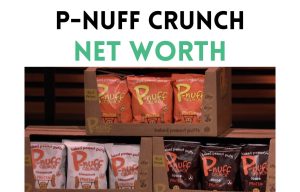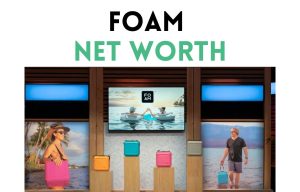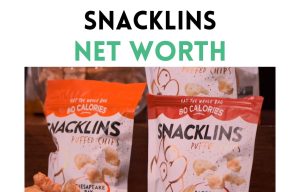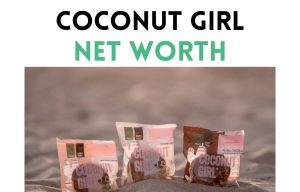Snacking is a big part of many people’s lives. People want something tasty, but they also worry about eating too many carbs or unhealthy ingredients. This is especially true for people on low-carb or keto diets. Many snacks on the market are full of sugar, starch, and preservatives. Even when people try to make healthier choices, they end up with snacks that don’t taste good or don’t satisfy cravings.
Cheese lovers often find themselves stuck. Regular cheese can be messy or needs refrigeration. Crunchy snacks are usually made with potatoes or grains, which are not suitable for low-carb diets. David Scharfman saw this problem and wanted to fix it. He wanted to create a snack that could capture the delicious, crispy cheese crust people love from grilled cheese sandwiches.
That’s how he came up with Just the Cheese. These bars offer a simple solution: they are crunchy, cheesy, low-carb, and shelf-stable.
David appeared on Shark Tank Season 11, hoping the sharks would bite on his crunchy cheese snacks. He offered them a unique product that is literally just cheese, baked into crispy bars. He asked for $500,000 for 5% equity in his company. The episode turned into a heated discussion with several offers and counteroffers on the table. But in the end, David left the tank without a deal.
His pitch highlighted the growing demand for keto-friendly and low-carb snacks but also revealed the challenges of competing in a crowded food market. Let’s dive deeper into his story and see what happened before, during, and after his appearance on Shark Tank.
Just the Cheese Net Worth Shark Tank Update 2025
David was looking for an investment of $500k in exchange for 5% equity in the company. At the time of the episode, he valued his company at $10 million. David did not secure a deal with any of the sharks and walked away without an investment. Since no deal was made, the company’s net worth remained at around $10 million. After the show was aired, the company experienced a good boost in exposure. As per my rough estimate, the current net worth of Just the Cheese is around $15 million.
| Shark(s) Name | Offer & Demand | Counteroffer | Accepted? |
| Kevin O’Leary | $500,000 for a $0.20 royalty per bar in perpetuity | $500,000 for 5% equity | No |
| Lori Greiner | $500,000 for $0.15 per bar until $750,000 repaid | N/A | No |
| Mark Cuban | $500,000 at 15% equity | $500,000 at 7.5% equity | No |
| Robert Herjavec | Out | N/A | N/A |
| Daniel Lubetzky | Out | N/A | N/A |
David Scharfman Backstory + Their Initial Pitch
David Scharfman grew up surrounded by cheese. His family runs a cheese business in Wisconsin, a state known for its dairy products. He always loved the crispy cheese that forms on the edges of a grilled cheese sandwich when the cheese hits the pan. David knew this crispy cheese was a favorite part for many people. He thought, why not turn it into a snack?
After moving back to Wisconsin from Asia, where he had tried unsuccessfully to sell cheese in new markets, David decided to focus on a new idea. He took the best part of grilled cheese, the crunchy, caramelized cheese, and turned it into Just the Cheese bars.
David faced many challenges at the start. It was not easy to turn melted cheese into a consistent, crunchy bar. He had to experiment with baking times, temperatures, and cheese blends. The production process had to be perfect to make sure the bars stayed crispy, tasty, and shelf-stable. David worked hard to get the right texture and flavor. He also had to figure out how to package the bars to keep them fresh without adding unnecessary preservatives.
When David pitched his product on Shark Tank, he came prepared. He showed the sharks samples of his crunchy cheese bars. He told them that Just the Cheese bars are made from 100% real Wisconsin cheese with no fillers or added starch. Each bar has only 75 calories, making it a guilt-free snack. They come in popular flavors like grilled cheese and aged cheddar.
David shared impressive sales numbers. In the year of filming, the company had made $3.7 million in sales. They were in 700 retail stores and had just secured purchase orders from 7-Eleven. They also sold directly on Amazon and their website. David believed the market for keto-friendly snacks was booming and wanted a shark’s help to expand.
David asked the sharks for $500,000 in exchange for 5% equity. This set his company’s valuation at $10 million. The sharks were interested but also skeptical. The stage was set for a tense negotiation.
Queries + Sharks’ Responses, and Final Deal
The sharks quickly began asking questions. Kevin O’Leary wanted to know how much it cost David to make each bar and how much he sold them for. David explained that it cost $0.95 to make a bar, and they sold for $1.99. Kevin did some quick math and pointed out that the profit margin was only around 17% to 20%. He told David this was very low for the food industry.
Kevin explained that companies with low margins struggle to make money because expenses like marketing, shipping, and staff eat away at profits.
Robert Herjavec tasted the bars and said he didn’t like the flavor. He told David he admired his passion and success, but didn’t think the product was for him. Robert explained that he wouldn’t invest in something he wouldn’t personally enjoy, so he was out.
Daniel Lubetzky praised David’s branding and packaging. He told him he thought the design was excellent and the product looked professional. But Daniel said there were already many similar cheese snacks on the market. He believed the competition was too strong and didn’t see enough space for Just the Cheese to grow big enough for him to invest. So Daniel also went out.
Lori Greiner shared that she had actually bought Just the Cheese from Amazon before and liked the product. But she worried about how little equity David was offering for such a large amount of money. She said there were too many competitors and she didn’t think it was a good fit for her. So she initially went out too.
Mark Cuban watched the negotiation carefully. He told David that the high valuation made the deal too risky for him. He said that the 5% equity David offered didn’t give him enough ownership to justify a $500,000 investment. Mark explained that the business was doing well, but he didn’t see a path to a big return on his investment, so he was out.
Kevin O’Leary saw an opportunity to make money in a different way. He offered David $500,000 in exchange for a royalty of $0.20 per bar sold forever. Kevin emphasized that he wasn’t asking for any equity, which meant David would keep full control of his company. But he would have to pay Kevin every time he sold a bar. Before David could answer, Lori came back in with a competing offer.
She offered $500,000 in exchange for a $0.15 royalty per bar, but only until she recouped $750,000. Lori’s deal looked better because it had an endpoint, unlike Kevin’s perpetual royalty.
David asked for a pen and paper to calculate how much he would pay under each offer. He countered both sharks with a lower royalty of $0.05 per bar, but only for ten years. He explained that higher royalties would put too much financial stress on the business, especially since he needed profits to grow. Lori said she couldn’t go that low but offered to limit her royalty until she got her money back. David still thought the royalty would take too much from the business and politely declined.
As the discussions continued, Mark Cuban decided to jump back into the conversation. He offered David $500,000 in exchange for 15% equity, with no royalty. David liked this better than the royalty deals, but felt 15% was too much equity to give up. He countered Mark’s offer, suggesting 7.5% equity instead. Mark refused to lower his demand and stayed firm at 15%. David thought hard but decided he couldn’t do it. He thanked the sharks and left without a deal.
What Went Wrong With Just the Cheese On Shark Tank?
David had a solid product, great sales numbers, and proof that customers liked his snacks. But several issues made the sharks hesitate. The first big problem was the profit margin. It cost nearly a dollar to make each bar but they sold for only two dollars. This left a small margin that would shrink even more when factoring in marketing, distribution, and staff costs. Kevin O’Leary called the margin “bad,” and the other sharks agreed.
Another challenge was competition. The sharks pointed out that there were already many baked cheese snacks on the market. Daniel Lubetzky worried the crowded space would make it hard for Just the Cheese to stand out or keep growing quickly. Lori Greiner shared the same concern, saying it wasn’t worth her investment in such a saturated field.
The sharks also struggled with the valuation. David valued his company at $10 million, which many sharks thought was too high given the challenges ahead. Mark Cuban said the equity offered wasn’t enough to make the deal worth the risk. He said a big investment for a small ownership stake just didn’t make sense. These reasons combined made most of the sharks decide to stay out.
Even though David had three offers on the table, the terms weren’t right for him or the sharks. So he left the tank empty-handed.
Product Availability
Just the Cheese bars are a unique snack made entirely of shredded Wisconsin cheese. They are baked until golden brown and crispy. The bars come in different flavors like grilled cheese, jalapeño cheese, and aged cheddar. Each bar has only 75 calories and is low in carbs, making it perfect for people on keto or low-carb diets.
The bars are packaged in pairs, so customers get a satisfying portion in each pack. They don’t need refrigeration and stay fresh for a long time, making them convenient to carry anywhere.
You can find Just the Cheese bars on the official company website, justthecheese.com. They are also sold on Amazon, where they have thousands of positive reviews from happy customers. Many people praise the crunchiness and rich cheese flavor. The bars have become popular snacks for people who want a crunchy treat without carbs.
Beyond online sales, Just the Cheese bars are sold at major retailers, including Walmart, Target, and some grocery stores across the United States. The prices usually start around $2 per pack, depending on where you buy them. Customers can buy variety packs to try multiple flavors. This helps the company attract cheese lovers who want different tastes and keep them coming back for more.
What Happened To Just the Cheese After Shark Tank?
Even though David left Shark Tank without a deal, his company continued to grow. In interviews after the show, he shared that sales increased as more people learned about Just the Cheese. The exposure from Shark Tank helped raise awareness of his brand. He also continued to secure more retail partnerships, putting his bars in thousands of stores across the country.
The company was featured in many publications, including The New York Times, The Boston Globe, Food Network, and Today, which gave it even more credibility.
In 2022, Just the Cheese reached a turning point. The company was sold to John B. Sanfilippo & Son, Inc., a large food manufacturer known for brands like Fisher Nuts. The sale price was not publicly shared, but by the time of the sale, Just the Cheese was making about $4 million in annual sales. This was impressive growth considering David started with a simple idea inspired by crispy grilled cheese.
Today, Just the Cheese products remain available in stores and online. They continue to attract new customers looking for healthy, crunchy, low-carb snacks. As for David, he became the co-owner of Specialty Cheese Company after the sale, where he continues to develop innovative cheese products. Although it seems unlikely we’ll see more updates about Just the Cheese itself, fans hope David might return to Shark Tank with another cheesy idea.
Conclusion
Just the Cheese started with one man’s love for crispy cheese and turned into a multimillion-dollar snack brand. David Scharfman went on Shark Tank hoping to find a partner to help him expand his business. Although he received offers from Kevin O’Leary, Lori Greiner, and Mark Cuban, he ultimately chose not to accept any deal.
The sharks’ concerns about low profit margins, strong competition, and high valuation were enough to keep them from making an agreement. But David didn’t give up. He kept growing his company, increased his sales, and sold Just the Cheese in 2022 for an undisclosed amount. His story shows that even when you leave Shark Tank without a deal, success is still possible with hard work and perseverance. Today, Just the Cheese continues to delight snack lovers across the country, and David remains a respected innovator in the cheese industry.

Hey, I’m Amna Habib, an undergraduate student pursuing a Bachelor’s in Business Administration. Shark Tank has always been one of my favorite TV shows because it offers a unique glimpse into the world of entrepreneurship. The way entrepreneurs present innovative solutions to everyday problems aligns with my academic interests and fuels my curiosity about business strategies. Each pitch showcases creativity and strategic decision-making, which I find both insightful and inspiring. Watching the show has deepened my passion for business and motivated me to explore the world of entrepreneurship even further. Beyond business and writing, I love food, shopping, and spending time with my friends and family.










